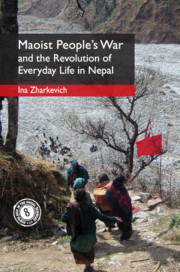Book contents
- Frontmatter
- Contents
- List of Figures
- Acknowledgements
- Glossary of Nepali Terms
- Introduction
- 1 Thabang: From Remote Village to Revolutionary Myth
- 2 The Moral Economy of War: The Making of the Base Area
- 3 Becoming Maoist in a Time of Insurgency
- 4 The Marital Economy of War: Reconfiguring Kinship Loyalties and Conjugality
- 5 Remaking the Tribe: ‘A Farewell to Bad Traditions’
- 6 Subverting the ‘Sacred Cow’: When Beef Becomes Edible
- 7 When All Castes Become One: Transgressing Caste Boundaries during War
- 8 When Gods Return to Their Homeland in the Himalayas: Maoism, Religion, and Change
- Conclusion
- Appendices
- Bibliography
- Index
Conclusion
Published online by Cambridge University Press: 28 March 2019
- Frontmatter
- Contents
- List of Figures
- Acknowledgements
- Glossary of Nepali Terms
- Introduction
- 1 Thabang: From Remote Village to Revolutionary Myth
- 2 The Moral Economy of War: The Making of the Base Area
- 3 Becoming Maoist in a Time of Insurgency
- 4 The Marital Economy of War: Reconfiguring Kinship Loyalties and Conjugality
- 5 Remaking the Tribe: ‘A Farewell to Bad Traditions’
- 6 Subverting the ‘Sacred Cow’: When Beef Becomes Edible
- 7 When All Castes Become One: Transgressing Caste Boundaries during War
- 8 When Gods Return to Their Homeland in the Himalayas: Maoism, Religion, and Change
- Conclusion
- Appendices
- Bibliography
- Index
Summary
It was for the transformation of society that people and the PLA fighters had shed their blood. This revolution was motivated by the October Revolution and the People's Revolution in China. Despite that, its modality was a Nepali one. It was for the Communists here to decide how to make New Nepal. Our aim was to achieve socialism in the country and our programme was People's Revolution. We have not been able to achieve it. The party document states that the party decided to come to the Peace Process in order to achieve that. But preparations have not been made in line with the party document. There has been a lot of corruption. The families of the martyrs are weeping. I also belong to a martyr's family …
See, despite the fact that the ten-year-long People's War was really fierce, many people were united and supported the party. It was so because there was a plan, policy, and aim. Why did around twenty-five hundred females obtain martyrdom? Because (the party) had a plan, policy, and programme. Eight hundred persons have obtained martyrdom in Rolpa alone. This number excludes those who have disappeared and those who were injured. Why did such a huge number of people sacrifice their lives? It was because the party had a plan, policy, and aim. On the other hand, people are depressed now despite the existence of a big party. Why? Why don't people see their future? This is because there has been an increase in defects in the party (parti bhitra kharabi maulaeko chha). This is what happens. Sometimes, I also get depressed. Sometimes, I tend to think what is this party life for. But I can't betray (the party) since there is a blood relationship of my family to this party [that is, the relationship through the martyrdom, blood, of Anita's husband]. Neither can I think of leading a personal life giving up party politics. This is my situation. Hence, I don't regret the sacrifice made by my relatives for the sake of the party. We must imagine that they died with dignity. They are really great. The important thing is that the leaders have not used the blood of the martyrs properly. The party has not been able to do so. I'm really sad to see this.
- Type
- Chapter
- Information
- Maoist People's War and the Revolution of Everyday Life in Nepal , pp. 260 - 275Publisher: Cambridge University PressPrint publication year: 2019



